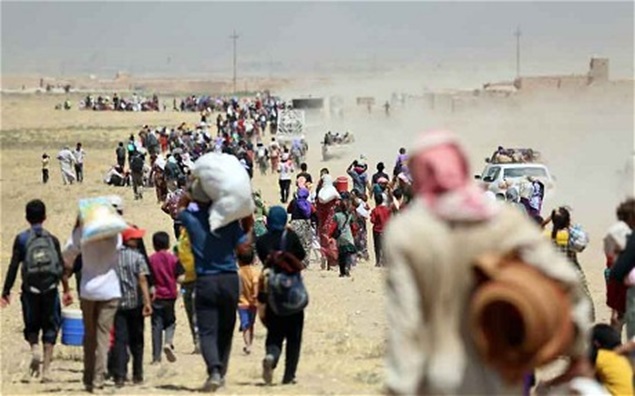Turkey´s double standard policy toward the Kurds
 the IS jihadists attacked the Ezidi ethnic minority in the city of Shengal and the surrounding villages and committed crimes of ethnic cleansing and genocide against the innocent Ezidi people. Turkey did not act and did not even condemn the crimes. Turkey did not send aid or supplies to the hungry Ezidi refugees who were trapped in a desperate situation on Shengal Mountain.
the IS jihadists attacked the Ezidi ethnic minority in the city of Shengal and the surrounding villages and committed crimes of ethnic cleansing and genocide against the innocent Ezidi people. Turkey did not act and did not even condemn the crimes. Turkey did not send aid or supplies to the hungry Ezidi refugees who were trapped in a desperate situation on Shengal Mountain.
Under the rule of AKP and Racab Taib Erdogan’s leadership, Turkey shows itself to be a democratic state, a supporter of human rights, and a protector of oppressed Muslim minorities. Turkey has previously hosted the international peace conferences and the conferences of theOrganization of Islamic Cooperation (OIC). Erdogan supports the Palestine people in their fight for freedom and sympathizes with Hamas in Gaza. In 2010 Turkey reacted against Israel´s sanction on Gaza and sent a ship of aid and supplies to Gaza in spite of Israel´s protest. Turkey criticized the West for its passivity toward the oppression of the members of the Muslim Brotherhood in Egypt.
In regard to the Kurds, Turkey has the opposite policy: it does not tolerate Kurdish political rights in Turkey, and it oppresses the Kurds. It is against Kurdish self-rule in northern Syria. Turkey bombards the PKK bases in northern Iraq and often kills innocent villagers in the border areas. This is also a violation of Iraq´s sovereignty. Turkey has supported the Free Syrian Army (FSA) and radical Islamic organizations such as the Nusra Front and the Islamic State (IS) in actions against the Kurds in northern Syria.
On August 3rd, 2014, the IS jihadists attacked the Ezidi ethnic minority in the city of Shengal and the surrounding villages and committed crimes of ethnic cleansing and genocide against the innocent Ezidi people. Turkey did not act and did not even condemn the crimes. Turkey did not send aid or supplies to the hungry Ezidi refugees who were trapped in a desperate situation on Shengal Mountain. This was in spite of the fact that Shengal Mountain is close to Turkey and the international community asked for urgent help.
On September 15th, 2014, the IS jihadists began their attack on the Kurdish border city of Kobani in northern Syria from three fronts. Turkish forces on the northern side of the city closed the border to block aid from the outside. Thus, the city was besieged by IS terrorists, and Turkey closed the only way out of the city. Turkey did not let outside help enter Kobani. Turkey actually tried to impose its conditions on the Kurdish authority in northern Syria while the Kurds were under duress. The incredible resistance of the People’s Protection Forces (YPG) and the Women’s Protection Forces (YPJ) in the city in spite of the lack of weapons caught international attention and caused anxiety. The United Nations and Western countries as well other states and communities asked for help for the Kurds, but Turkey did not react and waited desperately for Kobani to fall. Turkey regards the Kurdish forces that fight against the IS terrorists as PKK fighters; therefore, they are considered terrorists too. Erdogan has recently said that both the IS and the PKK are terrorist organizations.
When the YPG and YPJ fighters managed to stop the IS attack on the city after 35 days, the Kurdish regional government in Iraqi Kurdistan sent a small Peshmerga force to Kobani, but Turkey stopped the force for two days and did not let them go through until they had been thoroughly searched. Turkey had conditions dictating what types of Peshmerga force could enter Kobani. Turkey only allows Iraqi Kurds to go through. However, Turkey did not have any problem allowing thousands of foreign jihadists to cross the border and enter Syria to join the IS during the last three years. Furthermore, Turkey pressures the Kurds in northern Syria to let the FSA forces enter Kobani. The Kurds are refusing, and some leaders of the FSA have expressed their disagreement with Turkey concerning that. Why should the FSA forces enter Kobani? Why doesn’t Turkey send them to another Syrian border area where the IS has control?
The Kurdish TV channel NRT recently showed a video that revealed communication between Turkish soldiers and IS members on the Syrian-Turkish border. Other sources are also discussing the connection. Thus, there are still accusations of Turkish support for the IS.
On one hand, Turkey claims it is pursuing a peaceful solution to the Kurdish problem in Turkey, but on the other hand, it sanctions the Kurds in Syria. However, we have not seen any real steps concerning the solution to the Kurdish problem in Turkey, only empty talk. In fact, Turkish anti-Kurdish policy will not help either Turkey or the Middle East find a solution to the political crises in the region.
The Kurds have indicated that they support secularism and democracy in the region, and Kurdish self-rule or independence in their homeland will only strengthen stability in the region in the long run. No matter what the Turkish national interests are, the Kurds are an important people in the region, and Turkey’s acceptance and recognition of the Kurds will strengthen the relationship between them. This will help both Turkey and the region make progress toward democracy, peace, and stability.
By Shakhawan Shorash
15-11-2014

سەرنج بنێرە